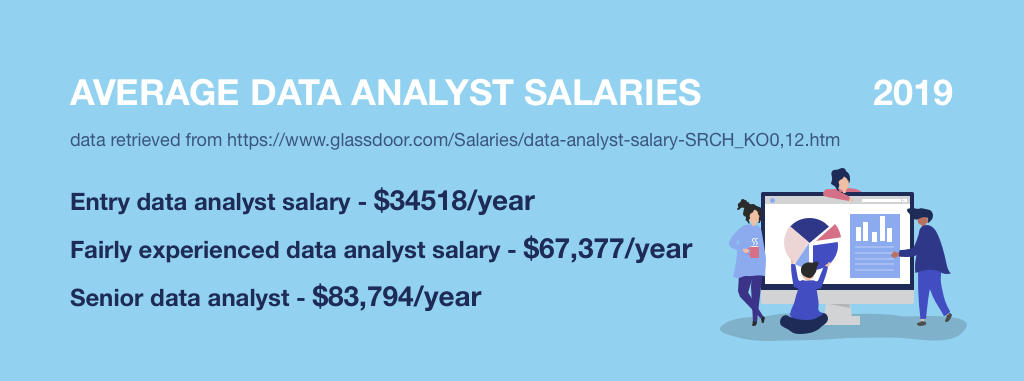A data analyst is a professional whose work involves collecting, cleaning, visualizing, and transforming or modeling raw data into the blocks of information that are used by marketers, developers and even accountants. The workflow of a data analyst is defined by the needs of a company or organization, but the final deliverable is always the same: well-structured and easy to retrieve data. As a data analyst, you are expected to have an analytical mind, strong mathematical skills, and flexibility. A bundle of narrow programming knowledge is also required although this is mostly a prerequisite for a data scientist. According to 2019 Payscale stats, the salary of a data analyst is in the range of $37,232 – $79,596, these figures may vary depending on the organization and the experience level of the individual. 
Step 1: Acquire a Relevant University Degree
The first and obvious place to begin your career is getting a university degree. As a matter of fact, the following specialties are widely accepted if you want to work with big data massives:
- Statistics
- Information Technology
- Computer Sciences
- Systems Analysis
- Mathematics
- Engineering.
Such educational background will lay the foundation needed to develop your data analysis skills further. Statistics and data analysis majors usually struggle with writing reports but it should not be your biggest concern.
Step 2: Get Supporting Big Data Analysis Certifications
Alongside a university degree, it is highly beneficial to acquire some certifications which will help to validate your skills, especially if you don?t have much experience in the industry. The certifications are used as a benchmark by employers to ascertain the analytical and problem-solving skills of an individual with respect to industry standards. Our takeaway from the list of useful big data analyst certifications includes the following courses:
- Amazon Web Services (AWS) Certified Big Data
- Analytics: Optimizing Big Data Certificate
- Hortonworks Certified Associate (HCA)
- Cloudera Certified Professional (CCP)
- Cloudera Certified Associate (CCA) Data Analyst
Getting at least two of these certificates will advance your job entry resume. While still studying, don?t hesitate and take up additional courses or get certifications. They will surely come in handy as you will look for your first job.
Step 3: Develop the Right Skills for Big Data Analysis
As the world of big data analysis continues to expand, there is a growing need to advance your analytical and problem-solving skills in big data analysis. All major skills of a data analyst are described below.
Mathematics/Statistics
Sufficient mathematical and statistical skills are a good basis to start off if you are interested in data analysis. Achieving excellent numeracy is a must considering the fact that you will be dealing with a lot of numbers. Most people major in this field while in the university, however, taking up a minor course is better than nothing.
Programming Skills
Specific programing languages and tools are used extensively in big data analysis. Being skilled with the key programming languages used within the chosen industry can support an entry career resume. Some examples of the programming languages and tools necessary to improve analytical and problem-solving skills:
- R ? This tool is used extensively by experts for data visualization and analysis. R is considered to be moderately, but once you have a good grasp of the language, it becomes an indispensable tool.
- Python – Experts prefer this programming language for several reasons. In big data analysis, Python programming language is handy for mining and analyzing data. Its extensive functionality is mostly because it is open source software creating the opportunity for people to develop a vast number of libraries for the language.
- Pandas is one of the libraries used in python for everything from data importation, processing, munching, and clean up to some advanced manipulation using its sophisticated data frame. Relevant Python libraries used by experts in big data analysis are NumPy, SciPy, Scilkit. Learn PyBrain and create neural networks in machine learning.
Other helpful programming languages and tools that can boost skill level and performance in big data analysis are SQL, Apache Hadoop, Apache Spark and NoSQl (read more about these tools here).
Data Exploration and Data Mining Skills
The ability to explore unstructured data and recognize its? size, characteristics, patterns, as well as its accuracy using the right tools and extracting useful information from pre-existing databases is the whole essence of the big data analysis. To improve your problem-solving ability, try to apply your knowledge to resolving everyday problems.
Visualization Skill Set
For a comprehensive skill set, endeavor to build your knowledge in real-time visualization using the available big data repositories. Tableau and Power BI are examples of visualization tools used by the experts in data analysis. Most of the time, your colleagues will ask you to represent the retrieved data using intelligible graphs, charts or maps.
Final Thoughts
Building the right skills to work with big data has a lot to do with getting the specific experience and certifications in the field. Although starting with getting a university degree is a good foundation, the lack of primary university education should not be a deterrent. Focus on developing the above listed skills and getting niche-relevant certifications, and you will have the chance to rise to the top echelon of data analysts. Setting real goals and consistent practice shall lead you to success. Most of the tools mentioned above have a robust online community that is both helpful and encouraging.